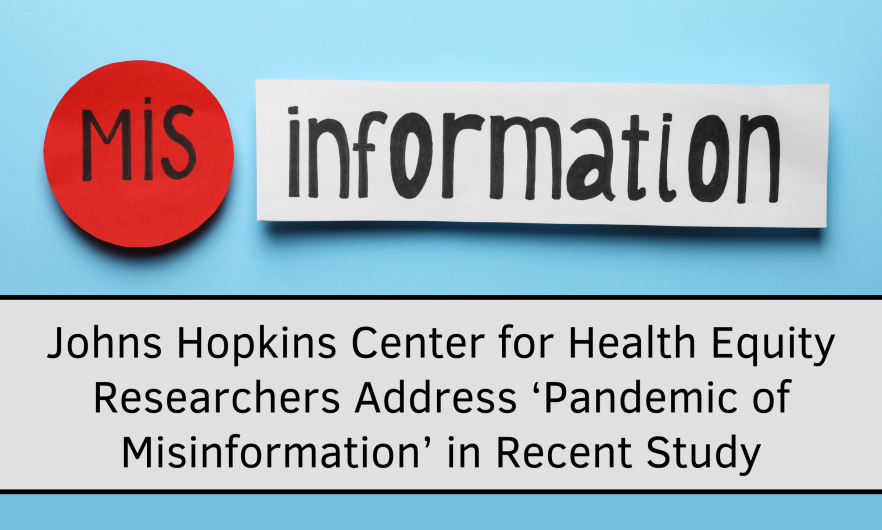Medical Misinformation Harms People from Communities that are Marginalized
Johns Hopkins Center for Health Equity Researchers Address ‘Pandemic of Misinformation’ in Recent Study

Medical misinformation has the potential to negatively impact health outcomes for people who have been marginalized. This reality became all too clear during the COVID-19 pandemic when medical misinformation, myths, and conspiracy theories abounded.
In a recent study, Johns Hopkins Center for Health Equity (CHE) researchers concluded that lower educational levels, health literacy, and greater medical mistrust are associated with misinformed COVID-19 beliefs.
The study, led by CHE pre-doctoral trainee Emily Carletto and her mentor, CHE Director Lisa Cooper, MD, MPH and published in the Journal of General Internal Medicine in June 2024, examined how participants’ social determinants of health (SDOH), sources of health-related information, and medical mistrust influenced their belief in COVID-19 misinformation and health conspiracy theories.
“We examined how participants’ social characteristics, access to scientific sources of information, and perceptions of health care correlated with their belief(s) in COVID-19 and health conspiracy theories,” says Dr. Cooper, director of CHE. “We specifically focused on education level and health literacy, as well as levels of medical mistrust and sources of health-related information.”
Between August 2020 and March 2021, the study surveyed 561 adults from CHE’s Rich Life Project in Maryland and Pennsylvania with hypertension and at least one of five commonly associated conditions with hypertension. The survey assessed incorrect responses to eight health-related and two conspiracy-related COVID-19 questions, with higher scores indicating more incorrect beliefs.
The findings showed that participants who did not obtain COVID-19 information from government and medical professionals were 28% more likely to believe in health myths. Those with less than a bachelor’s degree were 49% more likely to hold these beliefs, while participants with low confidence in filling out medical forms and higher levels of medical mistrust were 24% and 34% more likely, respectively, to believe in health myths.
Regarding conspiracy beliefs, participants with less than a bachelor’s degree were 22% more likely to believe in conspiracy theories. Individuals less confident in filling out medical forms and those with higher medical mistrust were 21% and 72% more likely, respectively, to believe in conspiracy myths.
Participants unwilling to get vaccinated were significantly more likely to hold both health and conspiracy beliefs.
After accounting for health literacy, education, medical mistrust, and source of information, participant race/ethnicity and age were not independently associated with health and conspiracy myth beliefs.
The researchers suggest that public health programs should target groups with lower levels of education and health literacy as well as those with higher levels of medical mistrust, encouraging reliance on scientific sources to combat misinformation.
